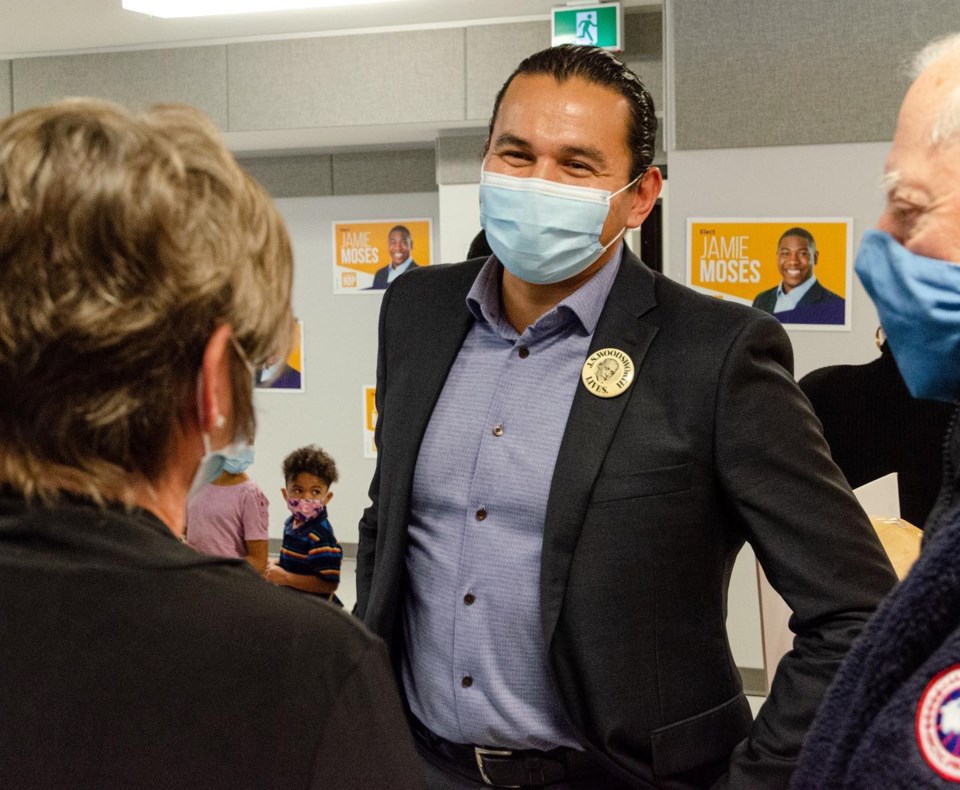The strain that the emergence of the COVID-19 omicron variant is putting on Manitoba’s health care system shows that the province needs to start thinking about its permanent expansion once the current crisis is over, the Opposition leader says.
NDP leader Wab Kinew, who spoke to the Thompson Citizen in December during a visit to Thompson, also says the Progressive Conservative government should improve its communication about the coronavirus pandemic.
“One of the things that really helps folks to buy into public health and to understand the severity of the situation is when we share the best information that we have with them,” he said. “I think the government’s decision to reduce the amount of updates per week was at a time when they thought that we were going to be leaving the pandemic. That’s clearly not happened so, given the fact that we need to maintain people’s motivation with the public health supports, that we need to continue motivating people to get vaccinations, I think it’s good to step up the information-sharing.”
Manitoba reported 2,012 new cases of COVID-19 on Jan. 11, as well as 418 hospitalizations due to the virus, up 40 from the previous day The number of patients in intensive care also went up by three and Kinew says ICUs are already overtaxed.
“We had people that work in the system who are speaking off the record because they fear for their jobs,” the NDP leader said. “Weeks ago, people were saying the ICUs were full so you can only imagine that now that the COVID situation has got so much worse that the situation keeps getting worse.”
The need to pull people from other areas of the health care system to staff temporarily expanded ICUs leads to people with non-COVID health problems suffering. In the north, which saw a record 259 new cases of the virus Jan. 11 and has 23 residents who are hospitalized due to COVID, the number of endoscopies dropped from June to October, resulting in the waitlist for the diagnostic procedure in the region growing by more than 50 over a five-month period. By the end of October last year, there were 633 people in the north on the waitlist, up from 581 at the end of June. Fewer than 100 of the procedures were completed each month from July through October, with only 17 performed in August.
“We’ve got to make sure that we get through this immediate challenge of the pandemic but even once we get through that there’s big challenges waiting around the surgical backlog and the diagnostic backlog,” said Kinew. “It’s a ticking time bomb. It continues to get worse every time we have a surge like this one when those folks can’t get the health care they need.”
What the COVID-19 pandemic has shown, Kinew says, is that the health care system in Manitoba is operating near capacity at the best of times and that unanticipated demands on resources, such as the COVID pandemic of the past two years, can push it nearly to the point of collapse. That is why he has called on the provincial government to ask for military assistance as the current wave of the pandemic continues. Right now, he says, the current needs are more than it can handle, though that might not have been the case if the government had started building it up after the pandemic first arrived in Manitoba in March 2020.
“Here we are two years later and we’re still saying let’s strengthen the health care system,” Kinew said. “What have we been doing for these past 20-plus months? At this point we don’t even have the option to make those kind of long-term gradual steps. We need an all hands on deck, ring the alarm type of response. We had well over a year-and-a-half where we could have been taking more methodical reasonable steps to training nurses, bring them along through the critical care training program, get the other health care professionals like respiratory therapists into position. If we had spent the last 20 months taking those steps one by one I think we’d be in a much better position overall as a province.”
Although the process of lurching from one crisis to another over the course of the pandemic is not ideal, Kinew feels it at least has made it plain that there are serious gaps in Manitoba’s health care system that need to be addressed.
“One thing that’s clear is that health care is going to have to be expanded going forward because, even let’s hope we get to the end of the pandemic stage of COVID, COVID will still be here and there is going to be a greater need for health care as a result,” he said. “It probably looks like we’ve got to permanently expand the number of ICU beds in Manitoba by like 20 or 30. It looks like we probably have to increase the access to primary care in the Northern Health Region and some of the other health regions. We’ve been through this traumatic experience of the pandemic. It seems like the responsible thing to do would be to study it, figure out what worked, what didn’t and then come back with recommendations for the future. Things have changed substantially and we need to be smart enough at a society level and at a government level to adapt and respond to that new reality.”




